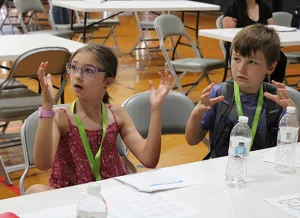Institute Provides Education, Support and Connection for Families of Children with Hearing Loss

Illinois families gained knowledge and formed priceless relationships during the 2023 Institute for Parents of Preschool Children Who Are Deaf or Hard of Hearing.
The journey to the 2023 Institute for Parents of Preschool Children Who Are Deaf or Hard of Hearing was a mixture of excitement, nerves and some fear for Kelly Lane and Crystal Harris.
When they received the flyer for the free one-week program at the Illinois School for the Deaf in Jacksonville, they were skeptical it would be the right fit for their son, Casper.
Casper, 4, has bilateral hearing loss, epilepsy and a developmental delay.
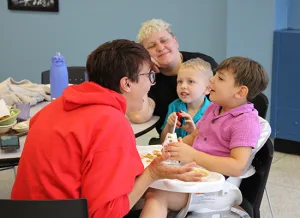
“We’ve been to other events on a smaller scale before that were geared towards families with kids who have hearing loss and felt out of place there because our son also has other disabilities,” Kelly said.
Crystal called the number on the flyer and spoke with Violet Wiker, the Family Liaison for the University of Illinois Chicago’s Division of Specialized Care for Children. Violet helps families enroll in the Institute and addresses any questions or concerns they may have.
Crystal said she talked to Violet for more than two hours.
“She assured me that there were kids of all different learning abilities here, that they would be in a classroom setting… she really sold it to me, really made me feel comfortable,” Crystal said.
She and Kelly then made the trip from Chicago with Casper and his big brother, Courtland. Once they arrived on the School for the Deaf campus, they knew they made the right choice.
“We couldn’t have felt more welcome… We’re used to feeling out of place, so it felt really good to come somewhere and feel normal for once,” Kelly said. “Coming here just felt like going home.”
A total of 22 families from across the state attended this year’s Institute from June 11-16. The Institute is for Illinois parents of children from birth to age 7 who have a significant hearing loss.
Participating parents attend daily lectures by experts in the field to learn about raising a child with hearing loss. Lecture topics include:
- Child development
- Types of hearing loss
- Language development
- Communication choices
- Assistive communication devices
- Deaf culture
- School programming
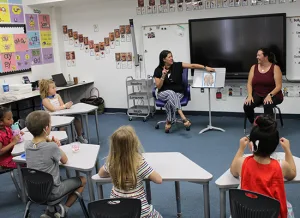
Other activities include meeting in small groups to discuss specific concerns and connecting with other caregivers.
The children with hearing loss attend classrooms based on their age group. Experienced teachers and aides for children who are deaf or hard of hearing oversee these classrooms.
Attending children also can receive hearing, vision, psychological, speech, language and educational evaluations. They also get to play with other children who have a hearing loss.
Siblings also attend the Institute and participate in fun and educational activities, including art projects and learning to sign.
There is no cost for families to participate in the Institute. Meals and housing are provided at no charge.
“One place, all questions answered”
Laura Colic’s son Liam is almost 5 and profoundly deaf. He wears bilateral cochlear implants that he’s had for a little over a year.
“I just wanted to get as much information to make sure that we give him all the opportunities, especially since he’s starting kindergarten in the fall,” Laura said of her decision to attend.
One of her favorite experiences from the week was listening to a panel of Deaf adults share their experiences.
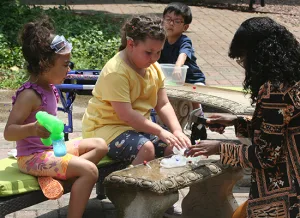
“When you’re in it with little ones, it’s hard to see what that may look like as they grow up. I love the exposure to just the Deaf culture. Even Liam has loved that. He has been so excited to see adults with cochlear implants” she said.
Laura also praised the knowledge of the team of professionals who spoke with families and provided evaluations for the children.
“Their knowledge is phenomenal, and I feel like it’s golden,” she said.
“I wish I could take them with me back home and just create this bubble for Liam. But I’m happy to take the knowledge that they’ve given me, the assessments they’ve provided, the one-to-one time with each of the different people that have worked with Liam and assessed Liam. The evaluations are just phenomenal.”
Sylvia Gavina is mom to 4-year-old Freddy. She appreciated the opportunity to see and understand what Freddy’s hearing loss truly means for him.
“Being able to meet with the professionals and learn what we did in a week takes it to a different level. At home, you might have an appointment one week and then wait three months for the next one. Here, we are leaving with a baseline. One place, all questions answered,” she said.
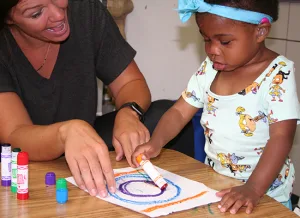
Sheryl Stone’s daughter Nevaeh is 4 ½ and attends the Illinois School for the Deaf. She said the Institute gave her an eye-opening look into how Nevaeh experiences the world. An education session on the Deaf experience helped her understand better what it’s like to not hear and to rely on lip-reading, sign language and other communication methods.
Eddi Fowler said she also learned how to better communicate with her 2 ½-year-old daughter, Kacey. In addition to learning American Sign Language (ASL) and cued speech, Eddi learned more about available resources and how to advocate for Kacey.
“I learned a lot, and I have a lot to take back home with me. I’ve got gigantic paperwork that’s going to help Kacey and my little family throughout the year with her education needs, her hearing loss, her autism, everything,” Eddi said.
“A community of families”
Three-year-old Christian has hearing loss in both of his ears. His parents Basia and Aaron said watching their son become more social with the other children was especially rewarding.
“He’s more expressive. With all the signing and the cued speech that we’re integrating, he’s using his hands more, different modes of communication. That’s something that we were really trying hard to get out of him at home and it’s been tough. But he seemed to really just open up to more people and other children as well,” Aaron said.
Sarah Berns attended the Institute with her son, Colsen, and daughter, Evelyn. Colsen, 7, was born with bilateral sensorineural hearing loss. However, his family was not aware of his hearing loss until he was 3 years old.
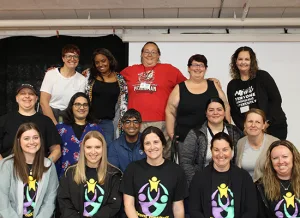
The Institute was the first time he could see other kids with hearing aids and cochlear implants and simply play with them and have fun.
Sarah said she also found a special connection with the other parents.
“I felt like I was all alone. And now I feel like I have a community of families that I can call when I need to talk to them about anything. I also got a lot of information about what my son is going through and what it’s like to be hearing impaired, which is the best connection that I could have with my son, and knowing more about him and what he needs,” she said.
The Institute was also just as valuable for Colsen’s big sister Evelyn.
“She sees that (hearing loss) isn’t something that’s terrible, her brother isn’t annoying, and that there’s this really cool language now that we can have between us that she wasn’t interested in before,” Sarah said. “There’s value in it for her… she has a newfound empathy that she didn’t have before.”
Sarah encourages all families of children with hearing loss to make the trip to the Institute.
“It is life-changing. There are people that value you for who you are, and they are only here to help and give you strategies to help you,” she said.
“A sense of comfort”
After spending a week at the Institute, Kelly and Crystal said they didn’t want to leave.
“We’re not ready to go home. This past week, I’ve felt a sense of comfort that I haven’t felt in a very long time,” Crystal said.
“And that’s saying a lot considering how much information overload has been happening,” Kelly added. “I feel like we should be feeling frazzled and overwhelmed with the amount of new information we’ve gotten, but instead I just feel clarity. I feel clear on where my son’s at, where we need to go, and the options that we have and resources that we have at our disposal.”
Sarah shared a similar sense of peace and optimism for her son, Colsen, after attending the Institute.
“Even though life is not the same plan I thought it was going to be, it’s still going to be wonderful…” she said. “Seeing these other people going through this and through their life, how their life has been impacted by having hearing loss, I realize that (Colsen) really hasn’t lost anything. He is just experiencing it in a different way, and that that’s OK, and that we’re going to be OK.”
Visit our Facebook page to see a photo album with more photos from this year’s program. You can also see videos that highlight different parts of the Institute experience on our YouTube playlist.
The following organizations supported the 2023 Institute:
- University of Illinois Chicago’s Division of Specialized Care for Children (DSCC)
- Department of Human Services – Division of Rehabilitation Services
- Illinois School for the Deaf
- Illinois State Board of Education
- Illinois Department of Public Health
- Ann & Robert H. Lurie Children’s Hospital of Chicago
The 2024 Institute will take place June 13-16. Please see the below flyers for more details:
For more information about the Institute and how DSCC supports children with hearing loss, call (800) 322-3722 or email dsccinstitute@uic.edu.



